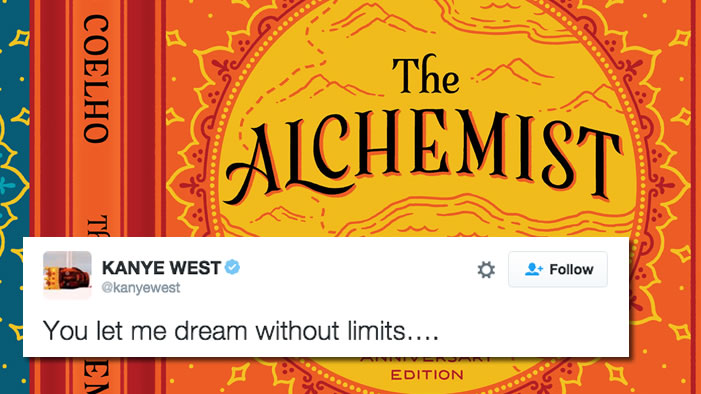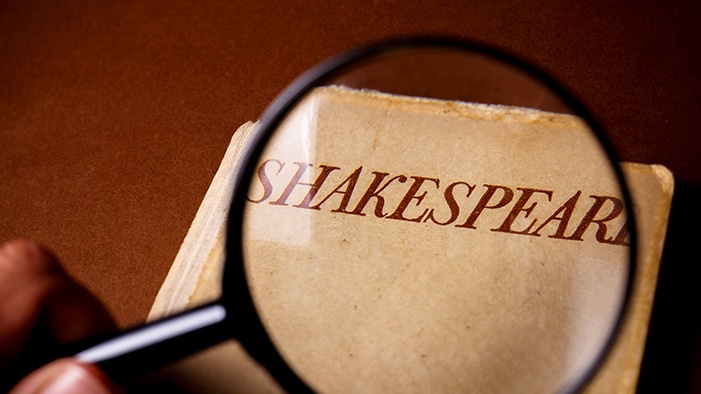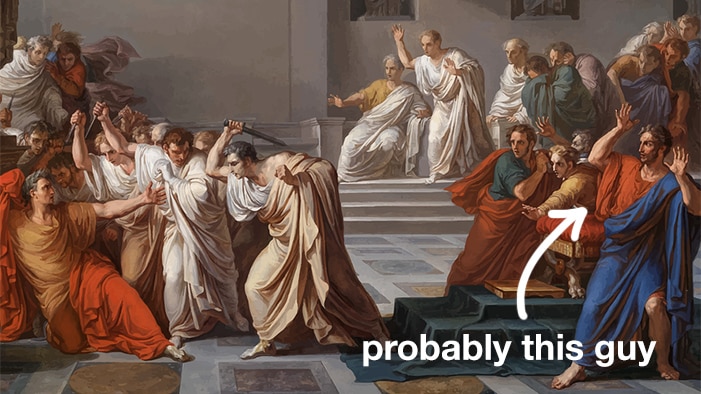Can Kanye West’s Tweets Be Explained by The Alchemist?

Kanye West’s Twitter feed is a cultural phenomenon. The whole world has eyes on his rants (he knows it), and just about everything he posts gets tens of thousands of likes and retweets within seconds. But Kanye’s account is isn’t just another celebrity showcase of fame through numbers. It’s different. There’s an inexplicable magnitude you feel when you scroll through his feed—Kanye wouldn’t waste his time tweeting about what he had for lunch, he’d eat his lunch and then tweet about philanthropy’s impact on creative expression.
Everyone on the internet interprets Kanye and his tweets a little differently. Some really don’t appreciate his narcissism and candor. Others applaud his undeniably fierce ambition. Some think he’s nuts but respect him completely anyway.
The thing is, to Kanye, none of this matters. He _does not care_ what anyone thinks but himself. It’s a beautiful thing, but in the form of Twitter, admittedly confuses me in the same way that any book written as stream-of-consciousness confuses me. And since we’re at SparkNotes, I think it’s about time we use a modern classic to explain what could possibly be going on in Kanye’s brainspace.
Enter: The Alchemist, by Paulo Coelho—a book about the personal and spiritual journey of a young shepherd named Santiago, who travels from Spain to Egypt in search of a treasure he’s seen in his dreams. (If this book hasn’t changed your life yet, it will.) Let’s take a look at Kanye’s tweets, and deconstruct them according to the book’s major themes.
Personal Legends
I am of service to the world with my art and I just want to serve more.
— KANYE WEST (@kanyewest) February 15, 2016
all with one purpose of creating beautiful product that can be attainable by everyone…
— KANYE WEST (@kanyewest) February 17, 2016
Let’s dance in the streets. I am consumed by my purpose to help the world.
— KANYE WEST (@kanyewest) February 14, 2016
The central theme of The Alchemist is the pursuit of Personal Legends, or what a person hopes to accomplish in their life, which is why Santiago leaves Spain to find the treasure he saw in his dreams. This is considered a universal truth in the novel:
“…whoever you are, or whatever it is that you do, when you really want something, it’s because that desire originated in the soul of the universe. It’s your mission on earth.”
The character of the alchemist that Santiago meets along the way tells him that the only way for the universe to attain perfection is if all people and things complete the cycle of achieving their Personal Legends. Similarly, Kanye tells Kanye that the only way for the universe to attain perfect is if Kanye achieves his Personal Legend.
His tweets express the gravity of his hopes and dreams, which are, as delineated above, to create “beautiful product[s]” and “help the world.” Those who put off Personal Legends only suffer regret, the alchemist continues, and it’s clear that Kanye adheres to a strict no-regrets policy.
—
Unity of Nature
It’s a beautiful time. I love my friends. I love my family. I love people. The human race.
— KANYE WEST (@kanyewest) February 24, 2016
I love the world bottom line and all I want is peace and positive energy
— KANYE WEST (@kanyewest) January 27, 2016
Coelho pens the term The Soul of the World, which is the force that binds together every living thing and material on Planet Earth. According to Santiago’s alchemist mentor in the story, all of these things share a common goal of forming a single spirit, which is evidently what Kanye believes is the “bottom line.”
—
Dreams
You let me dream without limits….
— KANYE WEST (@kanyewest) February 16, 2016
this country was built off of dreamers … never give up on your dreams, bro…
— KANYE WEST (@kanyewest) February 16, 2016
I’m proud as an entrepreneur that I gave everything I had to my dreams.
— KANYE WEST (@kanyewest) February 24, 2016
The entirety of The Alchemist is based on the dreams of Santiago, who leaves behind his flock of sheep, the comforts of his home region, and his love interest to follow them. Kanye is a dreamer, too, and his pursuit of those is exactly how he came to release College Dropout in 2004, and how he’s come to be a producer, fashion designer, and entrepreneur today.
The Alchemist equates the ability to follow a dream to personal enlightenment—and by these standards (as well as his own), Kanye is surely enlightened.
—
Adversity (The Desert)
I write this to you my brothers while still 53 million dollars in personal debt… Please pray we overcome… This is my true heart…
— KANYE WEST (@kanyewest) February 14, 2016
I don’t have enough resources to create what I really can…
— KANYE WEST (@kanyewest) February 15, 2016
I want to help the world and I need help to do it. I am an artist and I care about humanity.
— KANYE WEST (@kanyewest) February 15, 2016
Fame is often looked down upon in the design world, so it’s actually been something I had to overcome.
— KANYE WEST (@kanyewest) February 20, 2015
Before Santiago and the Alchemist go their separate ways at the end of the novel, the Alchemist tells him:
“What you still need to know is this: before a dream is realized, the Soul of the World tests everything that was learned along the way […] It does this not because it is evil, but so that we can, in addition to realizing our dreams, master the lessons we’ve learned as we’ve moved toward that dream.”
Santiago’s test takes the form of the desert through which he has to travel. It becomes clear that its harsh conditions—wars, uncertainty, emptiness—are necessary for his personal and spiritual growth. He learns that even though the desert is exhausting, it contains a lot of life, and, ultimately, the unifying Soul of the World. Santiago ends up using the desert to help free himself from captivity. Kanye’s desert has certainly been as rough as Santiago’s, and is currently his state of debt (also apparently his fame). But, as the alchemist prophecies, he’s used all the adversity he’s been faced with to deliver to the world new music, new projects, and new Kanye.
Will Kanye emerge from the desert triumphant? He has before, and Kanye thinks he will again, and that’s all that matters.
—
The Danger of Fear
You can’t control me or use the debt against me no more …
— KANYE WEST (@kanyewest) February 16, 2016
I don’t give opinions because they are commonly agreed upon. I say what I feel.
— KANYE WEST (@kanyewest) February 24, 2016
Fear is the most significant obstacle that Santiago faces in achieving his Personal Legend. He fears having his dreams interpreted by the gypsy woman, losing his wealth, and dying in the desert. Kanye fears nothing—not himself, not the media, not public opinion, and especially not death because he is probably immortal.
In The Alchemist, fear is deemed irrelevant if one can pursue one’s dreams to their potential, and that a life led by fear is unhappy and unfulfilled. From an interview two years ago:
“The risk for me would be in not taking one—that’s the only thing that’s really risky for me. I live inside, and I’ve learned how to swim through backlash, or maintain through the current of a negative public opinion and create from that and come through it and spring forth to completely surprise everyone—to satisfy all believers and annihilate all doubters. And at this point, it’s just fun.”
—
Conclusion: The Story of Narcissus
Let’s conclude with the Prologue, in which the alchemist reads the story of Narcissus (Narcissus kneels down to admire his reflection in a lake until one day he falls in and drowns—the danger of vanity). Except this story is extended: the forest goddess finds the water has transformed into salty tears. The lake says it’s crying for Narcissus, because it enjoyed its own beauty reflected in Narcissus’s eyes.
Is Kanye a narcissist?
Now they know pic.twitter.com/6c3OXYmkPG
— KANYE WEST (@kanyewest) February 9, 2016
Yes. But the moral of this prologue is that vanity actually does some good despite the harm. We feed Kanye’s narcissism, and in turn, Kanye feeds us with the content we so crave: a symbiotic relationship for the greater good of modernity.
Do you think Kanye’s read The Alchemist?












